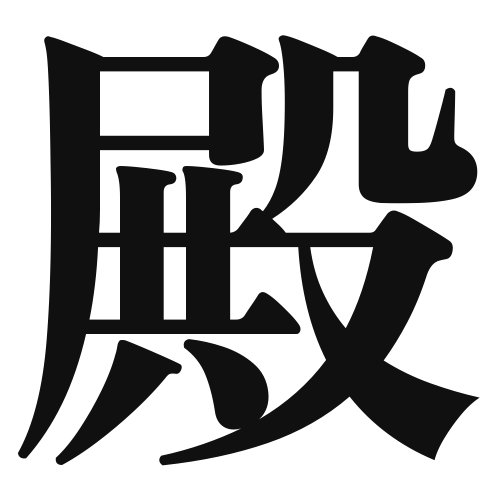1. Overview of Meaning
The kanji “殿” (pronounced “dono” or “tono”) primarily means “lord” or “master.” It is often used as a respectful title for someone of higher status, particularly in historical contexts.
2. Origin and Radicals
Formation of the Kanji: The kanji “殿” is a compound character, which means it is formed by combining different elements. It is classified as a phonetic-ideographic character, where the left part (土) represents “earth” and the right part (殳) relates to “to strike” or “to hit,” symbolizing a place of authority or residence.
Radical: The radical of “殿” is “土” (earth), which often relates to ground or land, indicating a connection to a physical place of importance.
3. Examples of Usage
Common Words and Phrases: “殿” is often found in words like “殿様” (dono-sama), meaning “lord” or “noble,” and “殿堂” (dendō), meaning “hall” or “sanctuary.”
Example Sentences in Daily Conversation:
- 「彼は私の殿です。」(Kare wa watashi no dono desu.) – “He is my lord.”
- 「この殿堂は歴史的な場所です。」(Kono dendō wa rekishiteki na basho desu.) – “This hall is a historical place.”
4. Synonyms and Antonyms
Similar Kanji: A similar kanji is “主” (shu), which means “master” or “owner.” While both refer to someone in a position of authority, “主” is more commonly used in everyday contexts, whereas “殿” carries a more formal or historical connotation.
Antonyms: An antonym for “殿” could be “奴” (yatsu), which means “servant” or “slave,” representing a lower status in the social hierarchy.
5. Cultural and Historical Background
Connection to Japanese Culture: The kanji “殿” is deeply rooted in the feudal system of Japan, where it was used to address samurai and lords. It reflects the hierarchical nature of traditional Japanese society.
Proverbs and Idioms: One common phrase is “殿の器量” (dono no kiryō), meaning “the capacity of a lord,” which refers to the qualities and abilities expected of a leader.
